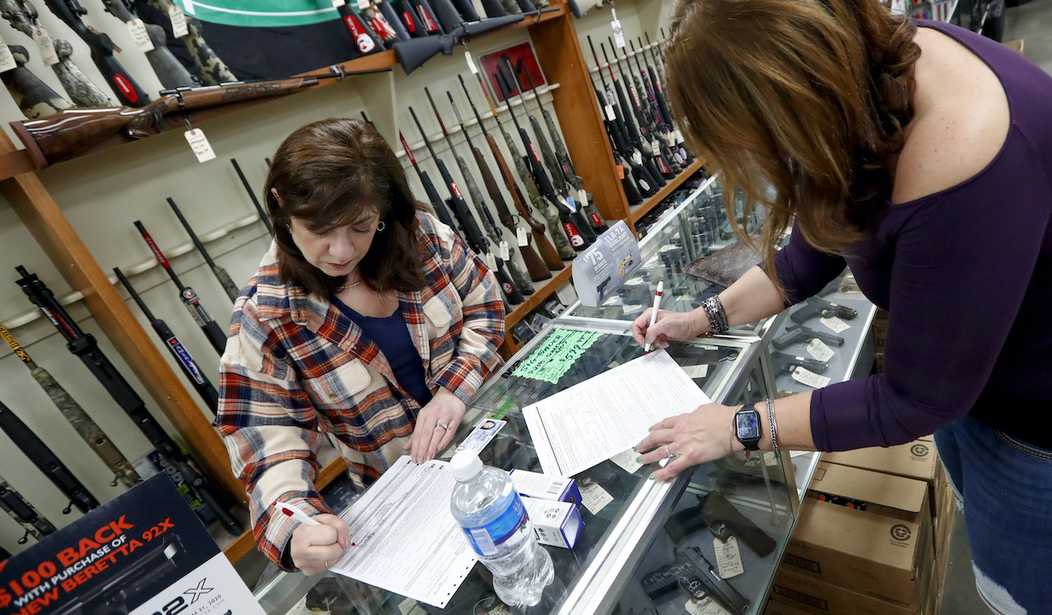Under Pennsylvania law, the state police are supposed to conduct firearms background checks “immediately” after a form has been submitted to them, and the process is to be conducted as “expeditiously” as possible. Some gun owners, however, have complained that the Pennsylvania State Police has intentionally understaffed the department responsible for conducting those background checks, leading to lengthy delays and a deprivation of their Second Amendment rights.
The group Firearms Owners Against Crime, along with a Pennsylvania gun shop and an individual gun owner, filed suit in state court last year taking on those delays and seeking help from the judiciary in forcing the agency to comply with its mission. On Monday morning, however, the state Supreme Court turned away the challenge from gun owners; ruling that the State Police have sovereign immunity from being sued over the delays and that the court doesn’t have the power to grant relief. From the decision (citations omitted):
Even assuming, as we must for purposes of considering preliminary objections, the factual allegation pled by Petitioners that they have experienced delays lasting from several hours to days or weeks in some instances in the processing of at least some of the background checks they have requested from PSP, their claim for mandamus relief is not viable as a matter of law for two reasons. First, in order to establish a mandatory or ministerial duty, a statute must be so explicit that there can be no room for argument as to the precise action required. Here, given that many factors can affect the amount of time it may take to obtain the information necessary to determine whether the proposed buyer is eligible to purchase a gun, and further given that PSP has a corresponding duty to protect public safety by obtaining and providing accurate background information to prevent weapons from falling into ineligible hands, it cannot be said that the response time duty is so clear and precise as to be susceptible to mandamus relief.
Second, the mandamus relief requested relates to operational matters, which are discretionary or not mandated in the statute at all. Petitioners request that we (1) order PSP to comply with Sections 6111 and 6111.1 by hiring or transferring from other PSP sections a sufficient number of new PICS operators to ensure that background checks are instantaneous and results are immediate; and (2) enjoin PSP from requesting or collecting the $2.00 fee for any background checks after which the purchaser or transferee cancels the transaction because of delays in the PICS system. Petitioners request this relief in both the Amended Petition and Application for Summary Relief in terms of mandamus.
Petitioners allege in their Amended Petition that PSP has understaffed the PICS Operations Section causing significant delays and lost firearm sales. They request that we order PSP to employ a sufficient number of PICS operators to ensure that background checks are conducted in accordance with Sections 6111 and 6111.1. Section 6111(b)(c) requires that PSP employ and train such personnel as are necessary to perform its duties “expeditiously.” The statute does not specify how many employees are “necessary” or how the PICS Operations Section should be structured. Rather, it leaves those decisions to PSP’s discretion.
Further, staffing and training decisions by PSP necessarily involve questions of budgeting and legislative appropriations, both of which we conclude are beyond the reach of this Court’s ability to grant mandamus relief. Even to the extent that the delays in conducting background checks and returning results are caused by staffing shortages in the PICS Operations Section, we nevertheless cannot issue a writ of mandamus dictating how PSP must staff, organize, or fund that unit when the Firearms Act leaves those matters to PSP’s discretion
It’s hard to square the Pennsylvania Supreme Court decision with what SCOTUS had to say in Bruen last year; things like background checks and even training requirements for concealed carry licenses may be presumptatively constitutional, but they can also thrown out if the supposedly “shall issue” policies are being used to abusive ends. In this case the state Supreme Court was willing to acknowledge that the delays in processing background checks could very well be the result of a lack of staffing on the part of the Pennsylvania State Police, but claim they’re powerless to intervene because its up to the legislature to appropriate the necessary funding.
Based on the ruling, it appears that there’s nothing stopping the legislature from defunding the PSP’s PICS Operations Section completely and putting a halt to both background checks on gun sales and the sales; nothing, that is, except for the slim Republican majority in the state Senate. What’s more, the court apparently believes that the PSP has the “discretion” to staff the PICS Operations Section as lightly as the commissioner decides. If even one person is tasked with conducting these background checks, the agency can argue that it’s still handling those requests as expeditiously as they can, though “instant” background checks could stretch on for weeks or months at a time.
In dismissing the case, the Pennsylvania Supreme Court declared “[w]e simply cannot declare that the statute requires particular staffing or funding without adding words or mandates that the General Assembly did not include. Similarly, we cannot specify that responses must be given within a fixed amount of time, or that fees be refunded for cancelled transactions.” The U.S. Supreme Court, on the other hand, says that they “do not rule out constitutional challenges to… lengthy wait times in processing license applications”. If that’s true for concealed carry licenses, then constitutional challenges to lengthy wait times for background checks to be processed should also be challengeable, and the courts do have a role to play in compelling the state to uphold its own responsibilities under the law. If Pennsylvania gun owners are going to get any relief from these unreasonable delays, it’s going to have to come from the federal courts, because the state Supreme Court has abdicated its own responsibility to hold the state to account.









Join the conversation as a VIP Member